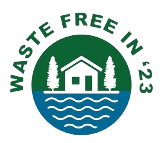WF23 SL How is WF23 Different

WASTE FREE HOW WF23 IS DIFFERENT INTRODUCTION - MR. ISHMAEL AMADU JALLOH YOUTH INITIATIVE FOR CLIMATE ACTION (YICA SALONE)

Good numbers of organizations are climbing to solve the issue of the unmanageable plastics in and around our communities but there is little or no feasible solution to some of the challenges of the plastic population.
A key difference that wf23 is making is that, they are working with local organizations who have to do everything when it comes to plastics pollution, they only offer guidance and support local CSOs AND CBOs to carry out their initiative to have a scalable solution towards the plastics waste in their community.
They empower people to solve the issue of trash by capacitating them with skills that can solve the unmanageable waste by building panels to reduce plastics and use the black soldier flies to breed in their waste.
They are working not to gain credit for their work but they are working just to see a solution towards the plastic issues in their various communities.
They work on sustainability instead of achieving a short term solution towards the plastic waste.
The waste free 23 is a local initiative that supports local people and communities. They are not working with any government agency or NGOs in their activities, they are working with local people to solve the climatic weather conditions that are seriously disturbing them.Many communities across the country and around the world are working towards zero waste. An example of why one community chose to establish a zero waste goal and plan is explained in the Executive Summary of the Sierra Leone cities and communities. Zero Waste is a philosophy and a design principle for the 21st Century. It includes ‘recycling’ but goes beyond recycling by taking a ‘whole system’ approach to the vast flow of resources and waste through human society.Instead of viewing used materials as garbage in need of disposal, materials are recognized as valuable resources. A pile of ‘trash’ represents community and economic opportunity including jobs and new products from raw materials.
The zero waste approach seeks to maximize recycling, minimize waste, reduce consumption and ensure that products are made to be reused, repaired or recycled back into nature or the marketplace.
Zero Waste:
- Redesigns the current, one-way industrial system into a circular system modeled on Nature’s successful strategies–creating products and packaging that are durable, can be reused or easily recycled
- Provides waste-based business opportunities to create jobs from discards
- Recognizes the importance of producer responsibility
- Aims to eliminate rather than manage waste
- Works to end taxpayer subsidies for use of virgin materials enabling reused and recycled products to compete.
If you have any questions, contact:
- www.wastefree23.org
- https://www.facebook.com/groups/1257683511822828
- Wastefree23@gmail.com
- Whatsapp +14084620209
